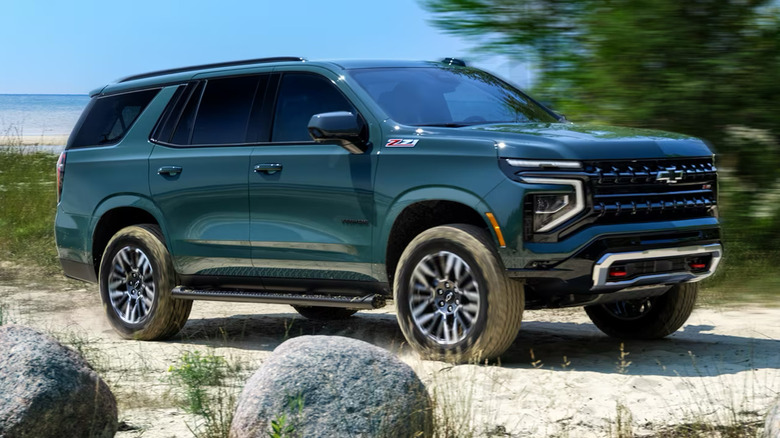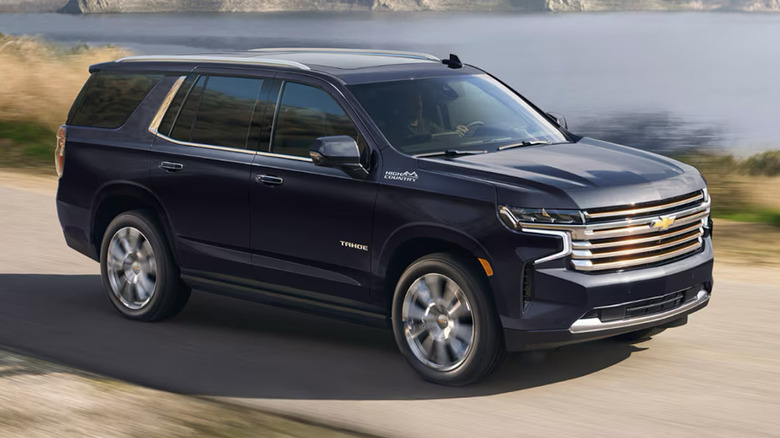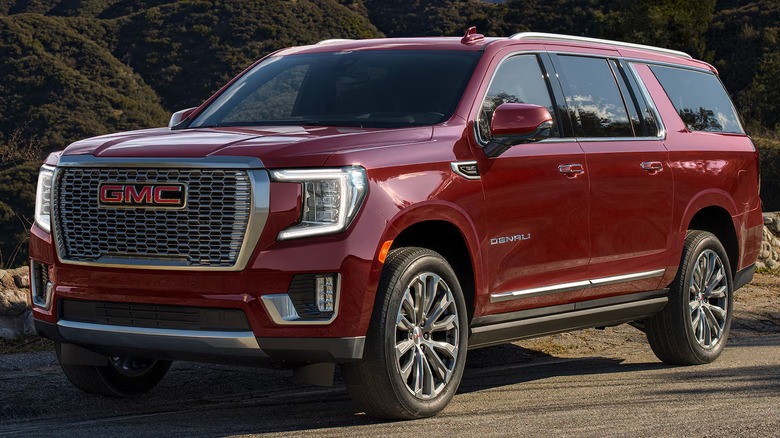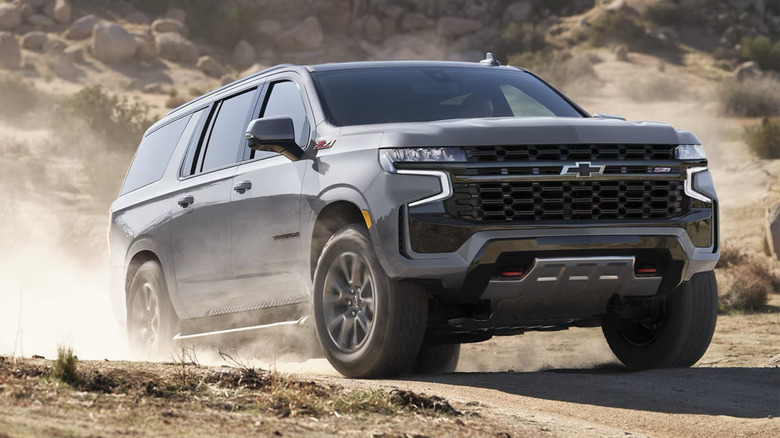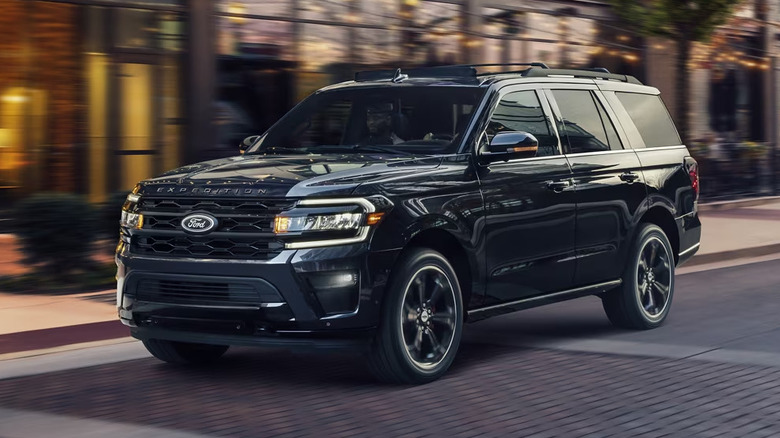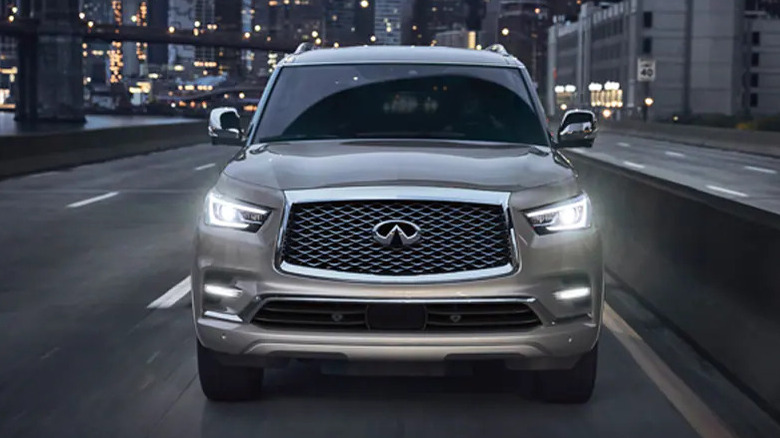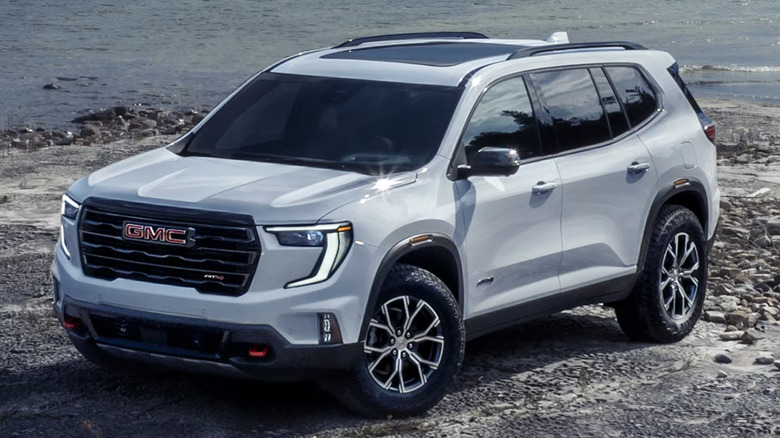5 Full-Size SUVs To Avoid When Looking For A Used Car In 2024
Full-size SUVs have a surprisingly wide appeal. The obvious utility for them is for large families who require a lot of space for children and all the stuff they need to bring along on a regular car trip. They give you many of the benefits of a minivan without the look of a minivan. But families aren't the only people buying these vehicles. It turns out there are also people who just enjoy driving large vehicles, value a lot of cargo space, want the safety that comes from being in a big car, or just like features like window shades and stowable seats.
If you are looking to purchase a used full-size SUV, it's important to do some research. There are a good number of full-size SUVs out there that are unreliable, have poor resale value, and may even feel quite outdated compared to other types of vehicles if you aren't careful. To help, here's a list of cars you probably should steer clear of, based on a consensus of ratings and reviews from a variety of different publications and institutions.
Chevrolet Tahoe
The list of the 25 best-selling SUVs in 2023 is packed to the gills with compact and mid-size SUVs, and only one full-size SUV cracks that list: The Chevrolet Tahoe. Despite its popularity, there are several different drawbacks to this full-size SUV. Most importantly, there are its issues with reliability. As rated by Consumer Reports, very few model years are ever able to pass the score threshold of 40 out of 100, and no model in the current generation has done that so far. Even the 2024 model ranks seventh out of the seven full-size SUVs rated by Consumer Reports. To be fair, each generation of the Chevrolet Tahoe does appear to improve as the years roll on. For instance, the truly needed-to-be-avoided 2015 Tahoe was subject to 16 different recalls, whereas one from 2020 had just three. Sadly, when Chevy introduced its next generation of the Tahoe in 2021, recalls ballooned back up to 13.
Historically, Dashboard Light does place the Tahoe above average in its reliability ratings of full-size SUVs on the whole, but that is due in large part to a peak in the early-to-mid-2000s. Otherwise, the vehicle dips into mediocrity. That means the quality Tahoes are now at least a decade and a half old, which may be an issue for you. Even then, you may be playing with fire, as CarComplaints shows nearly every year of that above-average period of the '00s with dozens of submitted issues from drivers. In particular, 2007 has the most submitted out of any single model year. You're probably better off looking elsewhere.
GMC Yukon
Chevrolet and GMC are both owned by General Motors, and a good number of the vehicles that each brand sells are basically identical. So it's probably no surprise that the GMC Yukon comes right after the Chevrolet Tahoe, since they're built on the same platform design. Due to their similar builds and mechanical components, the GMC Yukon receives nearly identical reliability ratings from Consumer Reports as its cousin, and in terms of performance, you are essentially getting the same experience too.
For some publications, those reliability ratings are actually significantly lower than that of the Tahoe, such as with Dashboard Light. In every single generation, it comes up short of the Tahoe's scores, and it is usually by double-digit metrics. For instance, it gives the 2007-2014 generation an 81 for the Tahoe, and that drops down to a 62.7 for the Yukon. The current Yukon is at a paltry 25.8. However, CarCompaints sees a good deal fewer submitted issues than its sister. In the end, the reliability all ends up evening out to about the same.
The differences between the two are more aesthetic than anything else. For instance, the GMC Yukon has a larger dashboard screen than the Tahoe, as well as slightly more premium interior finishes. However, the counterpoint to that is the Yukon tends to have a more expensive price, too. If the Chevrolet Tahoe was already a full-size SUV that you maybe should give a second thought to, the idea of paying even more money for a vehicle that's functionally the same makes little to no sense.
Chevrolet Suburban
General Motors unfortunately finds itself all over this list, including for its Chevrolet Suburban. The SUV, which is longer and has more features than the Tahoe, has undergone four different redesign generations (of the 12 across its entire lifespan), and no matter what the company creates, the reception to the Suburban rarely has a good balance of reliability and general owner satisfaction.
With the exception of the 2019 and 2020 model years, the Chevrolet Suburban has been subject to many of the same poor reliability and owner satisfaction scores from Consumer Reports as the company's other SUVs. Most of the model years do not go above 40 out of 100 rating on reliability, and there are several below 20 as well. It is quite concerning that the current generation that started with 2021, in particular, has dreadful reliability scores. J.D. Power also rates its quality and reliability as routinely average. Across its whole lifespan, Dashboard Light has its average reliability score in a near-tie with the GMC Yukon.
The Suburban has undergone so many different updates and generation evolutions over time, with that early 2000s period again being the highest rated. The 2007-2012 generation saw a major uptick in submitted issues on CarComplaints, with 2007 and 2009 being particularly poor years, and the Dashboard Light average of that era agrees with the downturn. Ultimately, the baseline mediocrity of its reliability barely ever wavers. That shows there to be some kind of inherent flaw that the company simply cannot crack.
Ford Expedition
General Motors is not the only American car company that produces full-size SUV models that leave quite a lot to be desired, and in many respects, this particular model rates even lower than the already mediocre Chevrolets and GMCs mentioned above. The next entrant on the list if the Ford Expedition, which has been around since the 1997 model year. In order to give a full picture, let's look at the reliability averages from Dashboard Light. At the high end, you have the Toyota Sequoia, with a 99 out of 100 score. The previously discussed models range between 65 and 77. The Ford Expedition is at the bottom of the list at 33, 17 points behind the next SUV.
The reliability ratings from Consumer Reports tell a similarly poor story. The only reason it doesn't reflect quite as poorly on the Expedition as Dashboard Light does is because Consumer Reports brings those Chevrolets and GMCs down to the Ford's level. The Expedition also struggles to earn a reliability rating over 40 out of 100, and there are even model years where it doesn't even get above 20. J.D. Power, as it typically does, rates its quality in the "Average" range rather than "Below Average" or "Poor," but the Expedition does routinely show up at or near the bottom of its annual ranking of full-size SUVs.
Unlike the previously mentioned vehicles, the Ford Expedition doesn't even have a heyday in the 2000s to fall back on for reputation, as CarComplaints shows that period to be the time when the SUV garners the most submitted complaints from drivers. Just about every metric that exists will tell you that this Expedition isn't worth exploring.
Infiniti QX80
Now, we move over to the luxury arm of the Japanese automaker Nissan, Infiniti, and its full-size SUV. The QX80 has been around for 20 years now, but it has rarely impressed, including here at SlashGear with its latest 2025 model, which we felt had too many quality and handling tradeoffs for a luxury brand. Since the SUV's beginning, it has not received any kind of rating from Consumer Reports until this most recent 2024 model year, which garnered mediocre ratings for both reliability and owner satisfaction. J.D. Power almost never gives the QX80 a score for quality or reliability, but does for things like driving experience and resale value. Dashboard Light doesn't even differentiate the QX80 from other QX models in its reliability scores, making things tough to judge. When sources for authentic drivers' experiences have little or no information, that's not a good sign.
Another indication of trouble is sales. The QX80 has struggled to crack more than 20,000 units sold per year in the U.S. over the last decade. What we can compare directly to even the other models already on this list are things like fuel economy, and the QX80 leaves a lot to be desired, averaging just 15 mpg combined. In the long run, that efficiency will only serve to cost you more money down the line. There have also been several recalls for issues ranging from fuel leaks to airbag problems to faulty rearview cameras. Uncertainty is not what you want on the used car market, and the Infiniti QX80 seems to have plenty of it.
Why these full-size SUV models were chosen
Plenty of different factors went into why these five full-size SUVs were chosen to be on this list. After all, the full landscape of this style of vehicle is incredibly wide, and choosing just five that a used car buyer should avoid is a rather difficult task. More than anything, reliability — or, more accurately, the lack of it — was the biggest component as to why a particular model would end up on this list.
We determined each vehicle's reliability with ratings from trusted sources like Consumer Reports, J.D. Power, Dashboard Light, CarComplaints, and Good Car Bad Car, tracking the ebbs and flows of each vehicle's specific model years. The number of recalls a particular vehicle has been subject to were also an important factor in determining reliability, as well as what the specifics of those recalls were. For instance, an airbag safety issue outweighs a problem with the SUV's climate system.
Once reliability was taken into consideration, owner satisfaction ratings were next in line, considering it would be wise to avoid cars that drivers don't particularly enjoy driving. Lastly, the Infiniti was chosen to represent the surprising lack of consistent coverage that full-size SUVs tend to receive from various sources due to their less than abundant market share compared to smaller SUVs.
